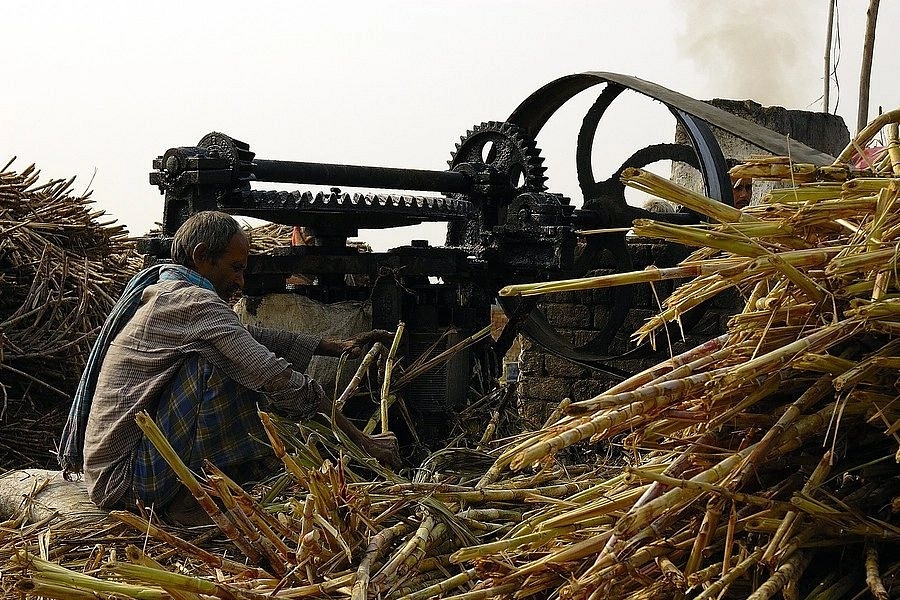Ideas
Water Guzzlers: Why Sugar-Based Ethanol Blending Might Not Be A Good Idea
- Using sugar-based ethanol for blending can impact the environment and the food security situation in India.
- The government should focus on reducing the share of sugarcane and incentivise the production of less water-intensive starchy crops.

(Flickr)
The Union government had announced a production linked incentive (PLI) scheme in June of 2021 wherein fuel companies might be required to sell fuel containing up to 20 per cent ethanol by 2023. Previously, the target was set for 2025, which was revised to 2023, indicating the government’s urgency to meet these targets.
Rising crude oil prices have inflated the oil-import bill, hastening the government’s decision to reduce its dependence on imported oil. For the first quarter of financial year 2022 (FY22), the fuel import bill totalled about $24.7 billion in the three months ended June 30, compared to $8.5 billion a year earlier, according to official data.
The bill has tripled despite the volume growth during the period being 15 per cent. With economic activities returning to normalcy and easing of Covid-related curbs, it is expected that oil prices will not go much lower.
The government has been providing incentives for private companies to set up ethanol production plants. State governments have also been asked to step in and encourage setting up of ethanol plants.
The multi-year sugar surpluses in India have prompted the move to sugar-based ethanol blending. Despite being a high cost producer, assured minimum selling prices, political support and subsidised resources have allowed India to emerge as the largest producer of sugarcane.
The high costs have induced the government to put up export subsidies in order to make Indian sugar competitive on a global scale. States like Maharashtra and Uttar Pradesh, which are the largest sugar producers in India, have a sugar lobby which represents the politicians’ interests. The politicians in these states have vested interests in the sugar industry, which has led to undue support extended to the industry, resulting in more acreage.
Further, sugar plantations guzzle huge amounts of water which makes them extremely water-intensive. Maharashtra, despite suffering from water shortages, spends a large part of its water reserves on sugarcane plantations. It is reported that the crop occupies 4 per cent of the state’s cultivable land but consumes 70 per cent of the state’s irrigation water.
With the push for ethanol, sugar prices are likely to go higher, signalling farmers to produce more sugarcane. An approximate rule of thumb is that it takes 2,500 litres of water to produce a single kilogram of sugar. Research shows that Brazil, which used its sugarcane surplus to produce ethanol, has been constantly facing droughts due to improper water management. Overall, the entire process could be extremely detrimental to India’s environment.
Farmers might even shift from other food crops to sugarcane in the search for higher profits, putting India’s food security in jeopardy. Water-intensive crops like paddy will probably be the first to be replaced by sugarcane if the prices of sugarcane go up. Crops like paddy are staple foods, which are consumed by many people all over India.
Despite the right intentions, using sugar-based ethanol for blending can certainly impact the environment and the food security situation in India. The government should focus on reducing the share of sugarcane and incentivise the production of less water-intensive starchy crops. These crops do not guzzle water and can be used as food or exported in times of surplus.
India has no comparative advantage in sugar production, a fact highlighted by the export incentives provided to sugar factories and mills. The ethanol targets can also be met through corn, sorghum, or other grains used to produce alcohols.
Farmers can be incentivised to shift to these crops rather than spending tax-payer money on running the entire sugar ecosystem. While sugarcane based alcohol-production is way more efficient, ramping up sugar production or allowing it to continue at current levels may only lead to desertification of our farmlands.
To reduce sugar dependency, the government has introduced schemes to incentivise grain-based distilleries; however, in order to prevent a shortage of these raw materials, the government must also incentivise cultivation of alternative crops.
Introducing ElectionsHQ + 50 Ground Reports Project
The 2024 elections might seem easy to guess, but there are some important questions that shouldn't be missed.
Do freebies still sway voters? Do people prioritise infrastructure when voting? How will Punjab vote?
The answers to these questions provide great insights into where we, as a country, are headed in the years to come.
Swarajya is starting a project with an aim to do 50 solid ground stories and a smart commentary service on WhatsApp, a one-of-a-kind. We'd love your support during this election season.
Click below to contribute.
Latest